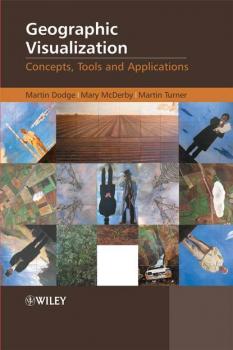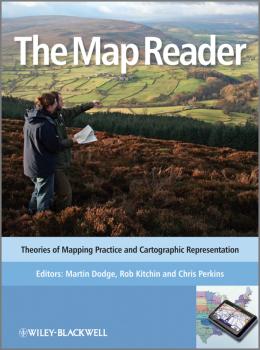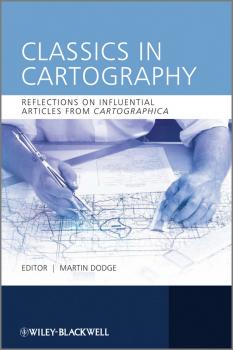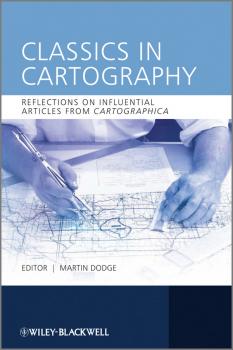ТОП просматриваемых книг сайта:
Martin Dodge
Список книг автора Martin DodgeАннотация
Geographic Visualization: Concepts, Tools and Applications is a ‘state-of-the-art’ review of the latest developments in the subject. It examines how new concepts, methods and tools can be creatively applied to solve problems relevant to a wide range of topics. The text covers the impact of three-dimensional displays on user interaction along with the potentialities in animation and clearly explains how to create temporally sensitive visualizations. It also explores the potential for handling mobile data and representing uncertainty; as well as the role of participatory visualization systems and exploratory methods. Hallmark Features: An introduction to the diverse forms of geographic visualization which draws upon a number of theoretical perspectives and disciplines to provide an insightful commentary on new methods, techniques and tools. Richly illustrated in full colour throughout, including numerous relevant case studies and accessible discussions of important visualization concepts to enable clearer understanding for non-technical audiences. Chapters are written by leading scholars and researchers in a range of cognate fields, including, cartography, GIScience, architecture, art, urban planning and computer graphics with case studies drawn from Europe, North America and Australia This book is an invaluable resource for all graduate students, researchers and professionals working in the geographic information sector, computer graphics and cartography.
Аннотация
WINNER OF THE CANTEMIR PRIZE 2012 awarded by the Berendel Foundation The Map Reader brings together, for the first time, classic and hard-to-find articles on mapping. This book provides a wide-ranging and coherent edited compendium of key scholarly writing about the changing nature of cartography over the last half century. The editorial selection of fifty-four theoretical and thought provoking texts demonstrates how cartography works as a powerful representational form and explores how different mapping practices have been conceptualised in particular scholarly contexts. Themes covered include paradigms, politics, people, aesthetics and technology. Original interpretative essays set the literature into intellectual context within these themes. Excerpts are drawn from leading scholars and researchers in a range of cognate fields including: Cartography, Geography, Anthropology, Architecture, Engineering, Computer Science and Graphic Design. The Map Reader provides a new unique single source reference to the essential literature in the cartographic field: more than fifty specially edited excerpts from key, classic articles and monographs critical introductions by experienced experts in the field focused coverage of key mapping practices, techniques and ideas a valuable resource suited to a broad spectrum of researchers and students working in cartography and GIScience, geography, the social sciences, media studies, and visual arts full page colour illustrations of significant maps as provocative visual ‘think-pieces’ fully indexed, clearly structured and accessible ways into a fast changing field of cartographic research Co-edited by Martin Dodge and Chris Perkins, Senior Lecturers in Human Geography in the School of Environment and Development, the University of Manchester; and Rob Kitchin, Professor of Geography, National University of Ireland, Maynooth.
Аннотация
Classics in Cartography provides an intellectually-driven reinterpretation of a selection of ten touchstone articles in the development of mapping scholarship over the last four decades. The ‘classics’ are drawn exclusively from the international peer-review journal Cartographica and are reprinted in full here. They are accompanied by newly commissioned reflective essays by the original article authors, and other eminent scholars, to provide fresh interpretation of the meaning of the ideas presented and their wider, lasting impact on cartographic research. The book provides an equal balance of influential articles from the past and current commentaries which highlight their impact and current context. Read in combination the original ‘classic’ articles and these new reflective essays demonstrate how cartography works as a powerful representational form and explores how various different aspects of mapping practice have been conceptualized by an influential set of academic researchers. Collates ‘classic’ articles from four decades of the journal Cartographica Brings key articles up-to-date with contemporary interpretative essays by the leading scholars in mapping research Themes covered are the epistemological of mapping practice, the ontological underpinnings of cartographic representation, and the contested societal implications of maps Evaluates the progression of the field of cartographic research and demonstrates how new theoretical ideas originate, develop and circulate Provides a signpost for students and new researchers on the key articles in cartography to read and reflect upon
Аннотация
Classics in Cartography provides an intellectually-driven reinterpretation of a selection of ten touchstone articles in the development of mapping scholarship over the last four decades. The ‘classics’ are drawn exclusively from the international peer-review journal Cartographica and are reprinted in full here. They are accompanied by newly commissioned reflective essays by the original article authors, and other eminent scholars, to provide fresh interpretation of the meaning of the ideas presented and their wider, lasting impact on cartographic research. The book provides an equal balance of influential articles from the past and current commentaries which highlight their impact and current context. Read in combination the original ‘classic’ articles and these new reflective essays demonstrate how cartography works as a powerful representational form and explores how various different aspects of mapping practice have been conceptualized by an influential set of academic researchers. Collates ‘classic’ articles from four decades of the journal Cartographica Brings key articles up-to-date with contemporary interpretative essays by the leading scholars in mapping research Themes covered are the epistemological of mapping practice, the ontological underpinnings of cartographic representation, and the contested societal implications of maps Evaluates the progression of the field of cartographic research and demonstrates how new theoretical ideas originate, develop and circulate Provides a signpost for students and new researchers on the key articles in cartography to read and reflect upon




